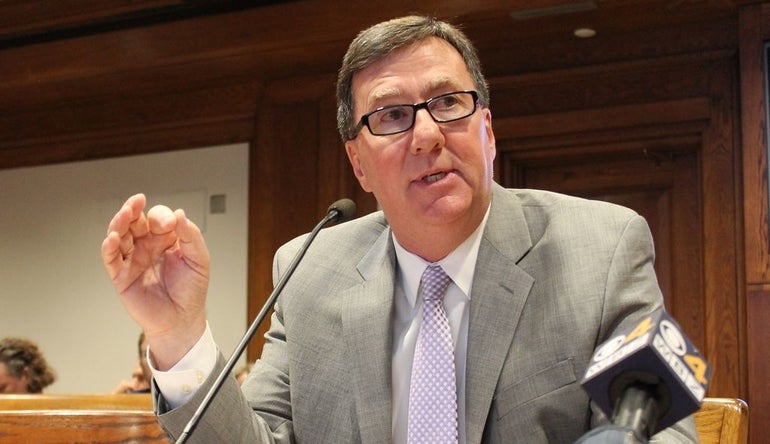Nonprofits speak out against property tax legislation
 Sam Doran/State House News Service
Rep. David Nangle of Lowell stressed that his bill would only affect the "top tier" of non-profits -- groups that pay their top five employees a total of more than $2.5 million per year.
Sam Doran/State House News Service
Rep. David Nangle of Lowell stressed that his bill would only affect the "top tier" of non-profits -- groups that pay their top five employees a total of more than $2.5 million per year.
Hospitals, human service providers, churches, YMCAs and land conservation groups turned out Tuesday to try to sink pieces of legislation that call for some non-profits to pay more in property taxes or community payments.
Among the bills on which the Joint Committee on Revenue solicited testimony were a Rep. Stephen Kulik bill (H 1565) and a Rep. David Nangle bill (H 3526), each of which would establish a different system whereby property tax-exempt organizations would contribute more to their host communities.
Nangle's bill would allow towns to charge non-profit organizations and educational institutions who pay their five highest-earning employees more than a cumulative $2.5 million 50 percent of the property tax liability for three years and then 25 percent in perpetuity. Those organizations would also be subject to property taxation when they purchase new property, on a sliding scale that settles at 25 percent of the total tax liability.
"Some of these non-profits, which are clearly doing extremely well, could afford to pay at least a fraction -- just a fraction -- of what other for-profit commercial businesses are paying," Nangle, a Lowell Democrat, said. He added, "If large non-profits are going to compensate their executives like a Fortune 500 company, then they should have the tax obligations of a Fortune 500 company. It's about participating in and helping the communities that they're a part of."
The Massachusetts Nonprofit Network, the Association of Independent Colleges and Universities, the Trustees of Reservations, the Massachusetts Council of Churches, the Massachusetts Health and Hospital Association, the Alliance of YMCAs, the Providers Council and MassCreative all testified in strong opposition to the bills, arguing that non-profits support the community by providing services rather than paying property taxes.
"It's clear non-profit organizations are the lifeblood of the commonwealth and the cornerstone of every community," Michael Sroczynski, vice president of government advocacy for the Massachusetts Health & Hospital Association, said. "The fact that these organizations receive tax exemption at the state and federal level is in recognition of the public good they offer to society and the help they provide to our most vulnerable residents."
Representatives from other non-profits argued the burden of property taxes would be devastating to non-profit budgets and constrain community services.
"We're only able to serve Massachusetts and its residents to the extent we are because of our non-profit status," said former U.S. Attorney Michael Sullivan, who now works with the Alliance of YMCAs of Massachusetts. "If we were forced to pay into a program, payment in lieu of taxes, there is no way we would be able to provide that quality, breadth and scope of services."
Nangle said his bill would "never, never ever" affect non-profits like YMCAs, soup kitchens, churches, sober homes or other community-based service providers because its provisions only apply to organizations that pay their top five highest-earning employees a total of more than $2.5 million annually.
"Honestly, I am only looking at the top tier of non-profits and charitable organizations," he said, estimating that his bill would affect 5 percent of the state's 38,000 non-profits. "It absolutely will never reach down to the smaller non-profits, the ones that I say do God's work."
Some of the larger non-profits that would be forced to pay more under his bill are "trying to get the smaller non-profits all worked up saying, 'we're first, you'll be next.' That's not the case," Nangle said.
Kulik's bill, backed by the Massachusetts Municipal Association, would allow municipalities to require property tax-exempt organizations to pay 25 percent of the amount that would be paid if the property were not exempt from taxation.
An aide to Kulik said he supports some aspects of the bill, but not all. As the Revenue Committee considers how to handle his and similar bills, the aide said Kulik asked that the committee conduct a serious study of property tax-exempt organizations and community payments.
Rep. Jay Kaufman, House chair of the Revenue Committee, said the committee has dealt with substantially similar bills in each of his five terms chairing the committee and asked that opponents work with the committee towards a solution that would also work for municipalities.
"We have been unable to come up with a protocol that addresses institutions across the commonwealth and also the spectrum of services that are delivered," he said. "This is a request for you to help us out with that."









0 Comments